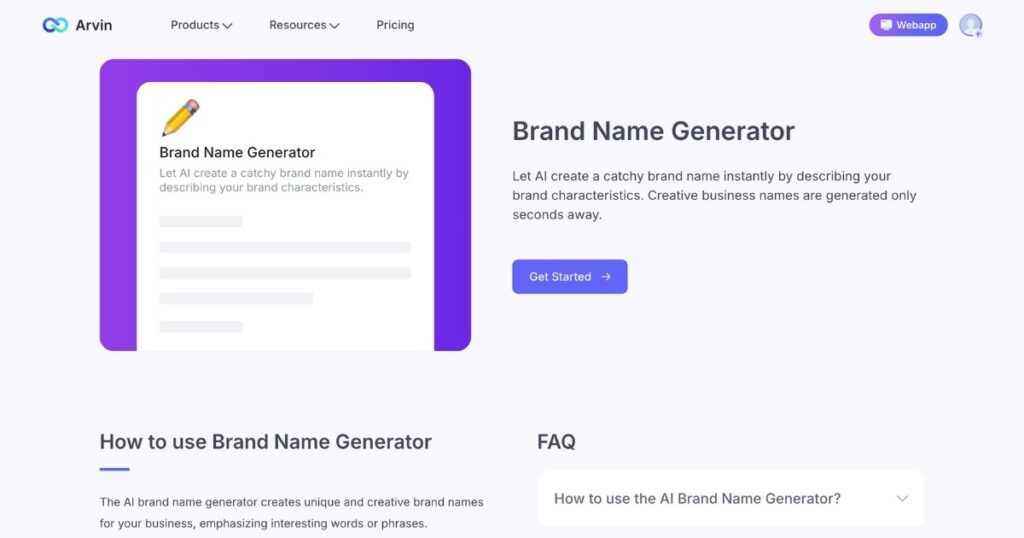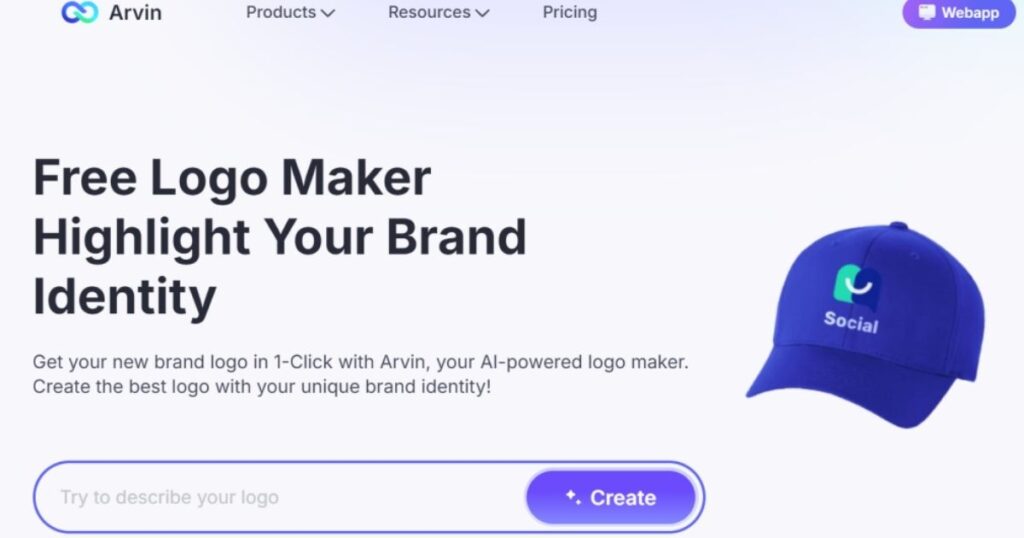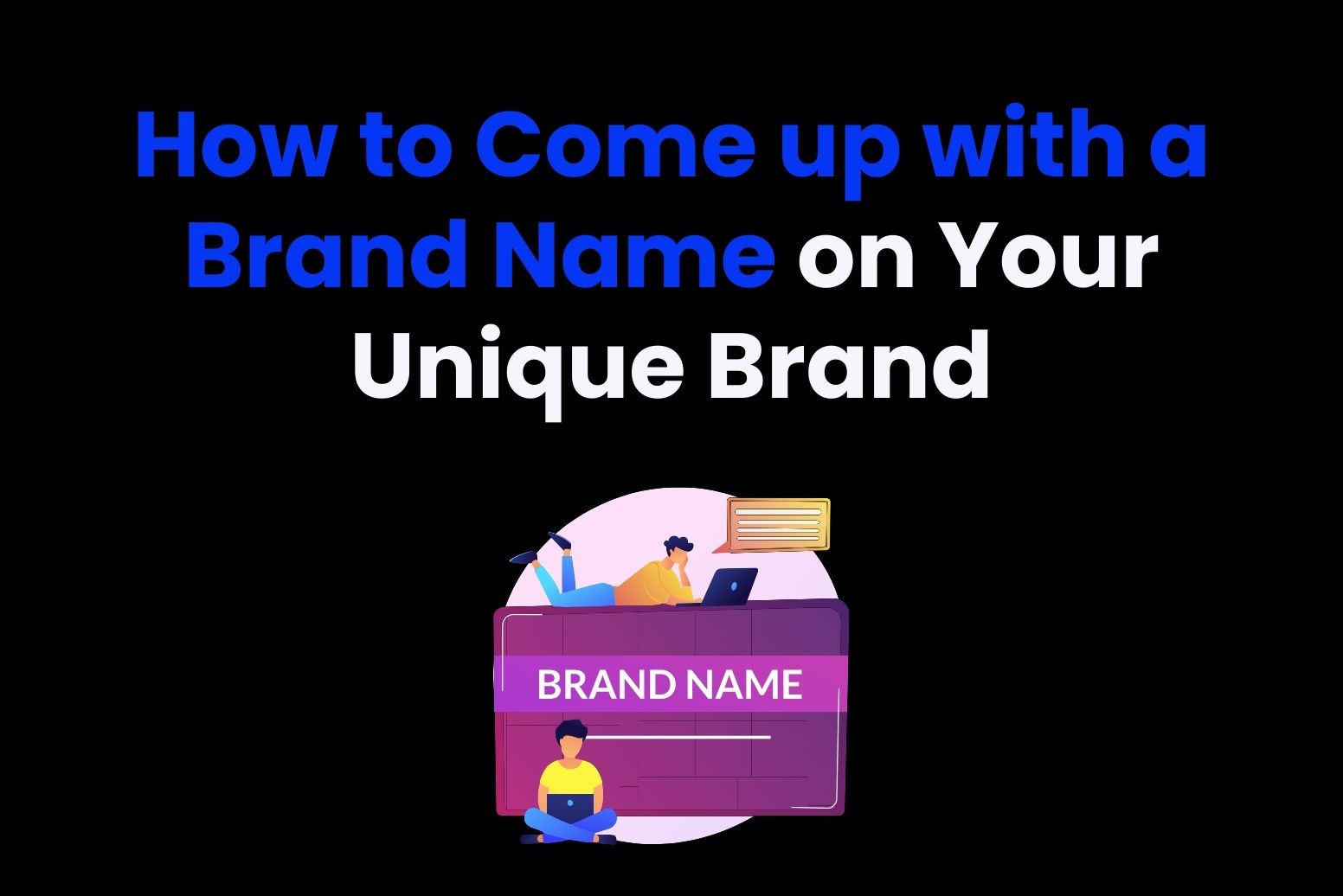Wondering how to come up with a brand name? You’re not alone. It’s one of the most challenging things about launching a business.
Picture the scene. You’ve perfected your business idea. You know your USP. You’re aware of your target market. And you’re ready to launch your socials and website. But what on earth should you call your business? How do you decide on a unique name that is catchy, professional, and relevant?
It’s a question that entrepreneurs ponder all the time. In fact, research shows that more than five million new businesses are launched annually in the US alone. That’s five million people who have to work out how to come up with a brand name!
So, to help you and the millions of other budding business owners out there, we’ve put together this comprehensive guide. In it, we start with the basics. We explain why your brand name is so important and introduce some non-negotiables.
We then encourage you to ask some crucial questions to help you check if your chosen brand name is aligned with your company’s ethos, values, and operations. As part of this, we explain how Arvin AI can help you come up with ideas that are relevant and unique to your business.
Finally, we run through some legal issues to think about before launching your brand. After all, you don’t want to fall foul of someone’s Trademarked name.
So, take a deep breath and join us. Your company’s new brand name is closer than you think.

How important is a brand name?
It’s difficult to overstate the importance of a brand name.
Did you know that Nike was originally known as Blue Ribbon Sports? Fortunately for the company, founder Phil Knight decided to change it just hours before the first shipment was due out of the door.
In Greek mythology, Nike was the Goddess of Victory, specifically in the fields of athletics, war, and art. In other words, it’s the perfect name for a sportswear brand looking to attract the best of the best.
At the very least, it’s more meaningful, evocative, and powerful than Blue Ribbon. Which, to most people, means nothing at all.
We’ve started with the story of Nike to make a crucial point – the name of your brand must reflect a key aspect or value of your business.
In Nike’s case, the name is embedded in the now-legendary company’s ethos and values in a way that Blue Ribbon could never have achieved.
It’s impossible to say for sure, but it’s unlikely that we’d all be clamouring for the latest Blue Ribbon sneakers when there are options from Puma, Under Armour, Adidas, and other iconic brands available.
So, if you’re struggling with how to come up with a brand name, don’t just settle on the first thing that comes to mind. Continue reading to discover your version of Nike!
Non-negotiables for your brand name
Granted, there isn’t only one way to create a brand name. Creativity should be at the heart of the process and you should be willing to push boundaries and pursue some blue-sky thinking.
Still, we feel there are a few non-negotiables you should know about. These are things that we believe your brand name must be. They will help to guide you as you run through your ideas:
It must be easy to spell and pronounce
While there’s nothing wrong with dipping into a foreign language for your brand name, you must keep things simple. There’s very little point in launching a brand name that few people can spell, pronounce, or even understand.
Just think about it – if your customers can’t spell or pronounce your brand name, how will they find you online?
Here’s a good example. In Swahili, “Nzuri” means “good,” “fine,” or even “beautiful.” But it’s not the easiest word to pronounce. If you drop the N from the start of the word, it still works and becomes “Zuri,” which is the accepted Swahili way of saying that something is beautiful.
Here, you have taken a word, shortened it, and made it easier to pronounce and spell for your audience without compromising its meaning. Use this as an example if you plan to use a foreign language to name your business.
It should mean something to you
When considering how to come up with a brand name, begin with words, places, people, or names that mean something to you.
As you market your brand as an entrepreneur, you can explain to your customers why you chose your brand name. People love buying into a branding story, and if you have a personal, authentic story to tell, it adds a new dimension to your brand.
After all, revealing your company’s origin story to have solid values and deep meaning is much better than admitting you just named your company after one of your competitors!
If you don’t know where to begin when considering how to come up with a brand name, jot down names and ideas that are meaningful to you. You can then play on these words and try ideas based on something unique and meaningful.
It shouldn’t contradict your product or service
The best brand names are relevant to the product or service they represent. You should consider this carefully.
If you’re planning to launch an online coffee business, a name like “Catcha Coffee” could work as a starting point. But what if you plan to introduce tea, cocoa, or other products in the near future?
Your original brand name will be too narrow. It won’t express the full scope of your products. After all, would you buy tea or cocoa from a coffee company? Perhaps, but it muddies the water and doesn’t necessarily help when it comes to marketing your products.
Of course, you can’t predict what the future holds for your product and service offering. But, you should be mindful of the services you want to provide before deciding on your brand name.
This is much easier than re-branding your company a few months later because your initial idea contradicts your new line of products.
It doesn’t need to be overly complex
One mistake that entrepreneurs make when thinking about how to come up with a brand name is over-complicating matters.
You might initially want to launch a brand with a clever, evocative name that has a deep-lying meaning. But it’s not actually necessary.
Just look at Elon Musk. He changed Twitter’s name to X, undoubtedly the simplest brand name in the world. What does it mean? Why did he do it? Does it have a deep, personal meaning to Elon? Maybe. Maybe not.
The point is that sometimes, the most straightforward names are the most effective.
Look at some of the world’s leading fast-food chains – Burger King, Kentucky Fried Chicken, Pizza Hut, etc. There’s nothing complicated about these brand names. They’re descriptive, easy to pronounce and spell, and aren’t particularly creative. But they’re hugely successful.
If you’re spending an eternity trying to come up with a brand name, stop. Take some time away and re-visit your branding in a few days with a clear head. You can then start afresh, keeping things simple in the process.
You can also use Arvin AI’s Brand Name Generator to help you get started. Simply identify the industry your brand operates in and highlight your firm’s values and characteristics.

Our tool will then provide some creative brand name suggestions. You can review our suggestions and consider how well they fit with your company ethos. You can then personalize or customize them to reflect your brand’s values and interests.
How to come up with a brand name: 5 key questions to ask
Following our non-negotiables, asking the right questions can help when you’re researching how to come up with a brand name. We’ve found that questioning the reasons behind your branding decisions can be helpful.
It can also help you to think clearly and prevent you from coming up with a name that misses the mark. With that in mind, here are five questions to ask as you go through the creative process:
1: What are my brand’s core values?
One of the best places to begin when deciding how to come up with a brand name is your company’s values. Actually, your core values are crucial for your branding guidelines and should shine through all the content you put out into the world.
So, if you haven’t done so already, list up to five values that are crucial to your company. Be specific. Be realistic. Make them relevant and appropriate. When you list your values, you can look for patterns and branding names that seem like a good fit.
If the values don’t actually appear in your brand name, that’s ok. They will come in extremely useful when you put together your branding guidelines, as mentioned above.
2: What are the naming conventions in my company’s industry?
Market research is essential when launching a brand. When considering your name, you need to think about the choices your competitors have used.
Are there trends or patterns in the industry? Is there a gap in the market you could capitalize on to position your brand in a great spot?
You can use the Arvin AI Research Assistant to help you with market research, data collection, and other related tasks. This can help you compile relevant information about your competitors quickly. You can then use it to consider how to position your own brand.
3: Does my brand require a personal touch?
You might be on the fence about whether to use your name in your company’s brand. Is it too restrictive? Is it necessary? Will it help you in the future?
Some of the world’s biggest brands carry the names of their founders. Just look at McDonald’s and Ben and Jerry’s as examples.
As the company founder, including yourself in your company’s brand name is a risky ploy, but it can pay off. An alternative is to use your initials or a part of your name if you don’t want to go all out.
We feel that this approach works best for companies that require a personal touch. If this is one of your company values, you might consider including your name as part of your brand.
4: Can my products or services speak for themselves?
You might be someone who has launched a product or service that can do the talking. It could be an innovative app or a food business serving a specific niche.
For instance, if you’re launching the first stylish kombucha bar in your neighborhood, keeping things simple with something like “Kombucha HQ” or “Kombucha Central” could do the trick. There’s no need to overcomplicate things, as you’re letting the product speak for itself.
You can of course lean into the name with personal branding on your socials, but letting a unique and much sought-after product like this do the talking will definitely help with your discoverability as a startup.
5: What do my peers, investors, friends, or family make of my branding ideas?
We get that you need to avoid concept dilution when you’re launching a brand. After all, some people that you ask for advice will try to channel their ideas into your business.
This is unhelpful.
Still, you need to seek feedback from people you trust, particularly before launching a brand name. Ask your peers, former colleagues, or a mentor if you have one. You can also ask friends and family members who you know will give you a straight answer.
While you don’t have to treat their feedback as gospel, seeking it will help you avoid issues and potentially notice things that you initially overlooked.
Legal considerations when deciding how to come up with a brand name
If you’re launching a hot new burger joint in town, you can’t call it McDonald’s. For obvious reasons!
This logic stands to reason in all industries, whether you’re launching a business online or at a land-based venue.
If you use a name that has been Trademarked by a company already, you risk a lawsuit.
Generally speaking, you will need to search for Trademarks and patents in countries where you plan to launch your product to avoid future issues.
This might seem like extra research, but it’s 100% worth doing from the outset. If you don’t do this research and end up using a competitor’s name, albeit innocently, it could cost you a lot of money further down the road.
If you plan on piggy backing off someone’s brand intentionally, don’t do it. Not only is this bad karma, it will get you in trouble.
So, do your research, consider which names have already been taken and whether you have a clear shot at using the brand name you have chosen.
If you’re registering a business in the US, this is a good starting point for your research.
How to come up with a brand name: Simple checklist of things to avoid
Before bringing this article to a close, we want to leave you with some things you should avoid when naming your brand:
❌Avoid using foul or abusive language in your brand. It should be inclusive and relevant to the broadest possible audience.
❌Don’t use a brand name that has been Trademarked by another company, as you may get sued.
❌Ensure that your chosen name doesn’t misrepresent the company. It should fit with your brand’s values, ethos, products, and services.
❌Avoid difficult spellings and words that are impossible to pronounce. You should make your brand name relatable to all.
Key takeaways
- Learning how to come up with a brand name is crucial for your business – you must take time to consider different options before making a decision.
- Your brand name should be easy to pronounce, and it should mean something to you. It doesn’t need to be complicated, and it shouldn’t contradict your core business operations.
- You can use Arvin AI’s Brand Name Generator as a starting point. It gives you relevant ideas that you can personalize to match your company’s values and ethos.
- Asking yourself key questions will help you decide which names are relevant and appropriate for your brand. Seek advice from people you trust before launching your new brand name.
The verdict: How to come up with a brand name that is unique, values-based, and catchy
So, how to come up with a brand name? As we’ve revealed, it doesn’t have to be complicated.
You should start with a blank canvas. Use our non-negotiables and then ask yourself the five questions we’ve introduced above. You can also use our generator to help you.
You then need to consider whether your brand reflects the ethos, values, and operations of your business. If it does, you’re good to go.
If it doesn’t, don’t be ashamed to return to the drawing board. It’s so much easier to put the effort in now and to get your name right instead of re-branding further down the line.
When you settle on your brand name, check out Arvin AI’s Logo Designer, which provides you with a professional and unique logo to use across your socials.

FAQ
There are several ways to come up with a brand name for free. Using your creativity and doing market research will help inspire you. It will also give you the opportunity to learn from other companies and brands within your niche.
If you’re stuck and you don’t know where to start, you can use Arvin AI to create brand name ideas that are unique and catchy. You can then tailor the suggestions to your company and consider whether the names are a good fit.
Catchy brand names will help your company stand out, but there isn’t a guaranteed method to develop such a name. You need to spend time researching the market and thinking about how to position your company. You should also consider your goals and values.
Often, the catchiest names aren’t the brand itself but the slogan. For instance, in Nike’s case, their “Just Do It” slogan is far catchier than the company’s name. Sometimes, pairing a simple, values-based brand name with a catchy slogan can work wonders.
Within reason, yes, you can. But you need to be careful not to infringe on another company’s trademark. You also can’t copy the name of a competitor or another brand working within your niche.
We also highly recommend avoiding foul or controversial language when naming your company. Keeping your brand name politically correct will save you from hassle and ensure that your brand is accessible to all.
There’s no right or wrong answer to this question. For some people, it works well, but for others, it’s not a good idea. We touched on this issue in the article above. If you would like to add a personal touch to your brand, including your name or your initials can work well.
Just make sure your name is easy to spell and pronounce to avoid issues down the line.


